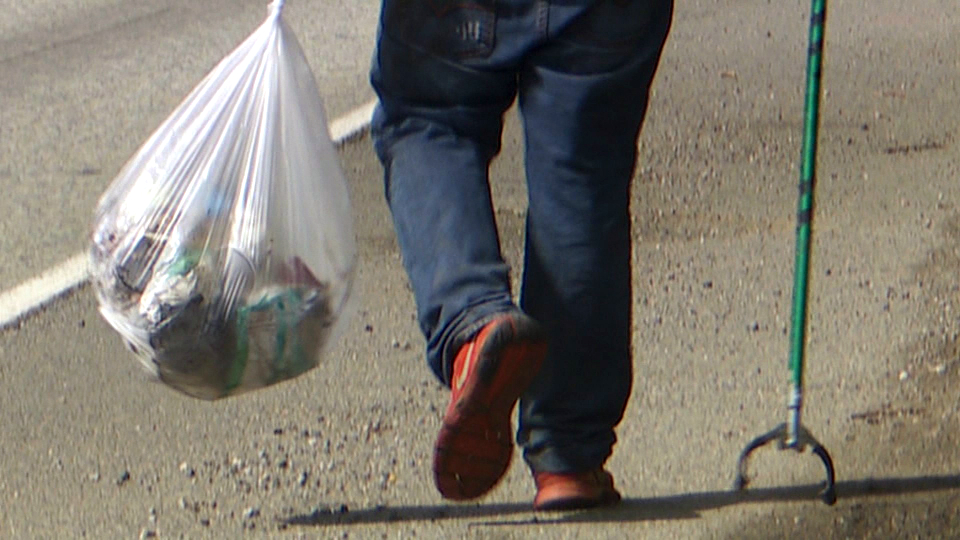King County's Community Work Program should be a bargain for both criminal offenders and taxpayers.
The program spares low-level offenders jail time and sends them into the community to pay for their crimes by cleaning up streets and parks. Taxpayers win because they aren't footing the high cost of jail time.
But a KING 5 Investigation found that Community Work Program crews don't spent much of their eight hour shift actually working. Reporters documented CWP crews taking hours to reach their job site, enjoying generous lunch breaks, and hanging out at shopping centers.
It's all happening under the watch of paid King County employees. Acting on a tip, KING 5 crews tailed some of the half-dozen vans that carry offenders to job sites six days a week. The vans pick up offenders at 7:30 a.m. near the King County Courthouse in downtown Seattle.
Over the course of two weeks, KING 5 spent multiple days watching as a couple of the vans routinely made the first stop on their shift at a deli in the International District. On one day, a van left the deli and took a meandering drive toward the Renton/Skyway area. KING 5's vehicle lost track of the van after nearly two hours of driving, during which the crew stopped at a grocery store and a gas station.
The KING 5 Investigators were able to monitor work crews from beginning to end of four full shifts. The longest a crew worked on those days was 3 hours and 46 minutes. On each of two other days the crews watched by KING 5 worked less than two hours. Most of the time during those shifts was spent driving around or hanging out in shopping center parking lots.
KING 5 asked Community Work Program Supervisor Sam Ong how long he'd worked his crew one day.
"I would say, minus lunch and break, six – six and a half hours," Ong said.
But Ong's crew was observed from the beginning of the shift that day until the end -- and the total time worked was 3 hours and two minutes.
"There's no way you can do exactly eight hours, driving time and everything," Ong said when told that he and his crew had been watched.
King County's Work Program Supervisors are paid about $60,000 a year to drive and monitor the half-dozen or so offenders that make up a work crew. They travel in vans to communities across the county where they clean up and mow along streets, parks and other public areas.
About 3,000 offenders convicted of misdemeanor crimes -- including assault, theft and driving offenses -- were sentenced to the program last year.
The head of Seattle University's Criminal Justice Department wonders how offenders view the cushy work schedule.
"It might be the message they are receiving is that it's a joke. That crime does pay," said Dr. Elaine Gunnison.
Scroll down to continue reading.
A supervisor's house in Shoreline
On one Tuesday morning, a supervisor led his crew to a house in Shoreline. There they hauled out green garbage bags, lawn and tree clippings, at least one weed eater, and a can of gas. They packed it all into a trailer attached to the work crew's van. KING 5 later learned that this was the house of Gary Lu, the work crew's supervisor. Lu confirmed the house was his when asked by KING 5, but he wouldn't say if he had his crew picking up his personal trash or yard waste.
"I have no comment on that," Lu said as he walked away from the camera.
"(That's) a fairly straightforward violation of King County's ethics code," said the former chair of King County's Ethics Commission – University of Washington Professor Pat Dobel.
Dobel says it's a shame that a program that is good for taxpayers and teaches offenders the value of an honest day's work would be abused in such a way.
"This is a program that has really good intent, and if it is well done has really good outcomes," Dobel said. (Watch more from his interview below.)
The head of the King County Department of Adult and Juvenile Detention made no excuses when contacted by KING 5.
"Yeah, the bottom line is that accountability is not where I would have hoped it would have been," said director William Hayes during an interview. "It's not my expectation. I don't think it's the expectation of the county or the citizens of King County. And it's something that we're gonna fix."
Hayes said he immediately added accountability checks to the Community Work Program supervisors' daily routine, like calling into management when a job is finished.
He said his office is investigating and will determine afterward if anyone should be punished.
"This is definitely an area that needs lots of improvement," Hayes said.


